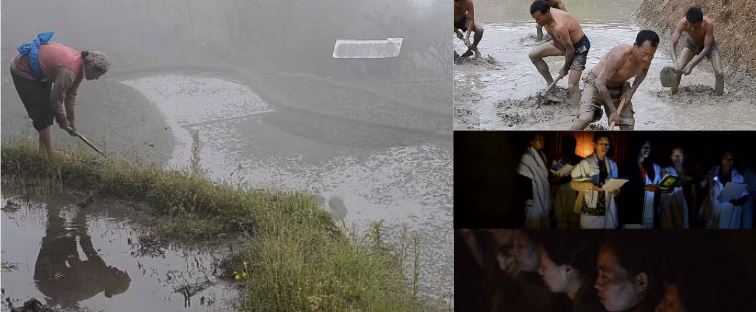Amidst the sounds of squelching and splish-splosh of the wet terrace fields in Phek village, Nagaland, there’s a song in the air with a persistent lilt. A group of women, while working in the rice fields, sing to their lovers –
“If not for you, I have no other true love
When we work together the sun sets early
If not for you, I have no love…”
On Saturday, Cinema Rendezvous held the screening of the documentary Kho Ki Pa Lu (Up, Down and Sideways), directed by Anushka Meenakshi and Iswa Srikumar. The documentary trails the cultivators, men and women, who sing while working on their fields.
‘Kho Ki Pa Lu’ is a phrase used to describe polyphony in Chokri language of Nagaland; the notes in the melody go up, down and sideways. The movement in the sound is organic, sometimes deliberate, and sometimes keeping up with the pace of work. The documentary is a musical portrait of a community of rice farmers in the village of Phek in Nagaland.
The 86-minute documentary is also conversational; the camera trails the rains, the lightning, the buzz of bees and dragonflies, and the isolated rain drop on a leaf. And when not following nature, the camera follows people, their work, and their stories.
During peak cultivating season, when everyone works alongside friends and family in the fields, it’s tradition to invite select people to your ‘mule’ and help in cultivation. While they work, they sing and reminisce.
In the documentary, people talk about what they sing. A young man working with his friends talks about missing his wife while working. “I long for her to come and watch me work,” he says, while his friends tease him of constantly thinking about her. Another young man talks of channeling his inner feelings while in the field. When feeling angry, he channels it all to his work.
Recommended
The women share stories of feeling lonely, of being away from their family and friends. Some even talk about the way they taught a boy a lesson for groping them all the time. The older men and women speak of the war and how their village was razed. Their poignant stories reflect the strained relationship between Nagaland and the Indian army. The silence that accompanies the shot displaying the presence of the Indian army in Phekt is enough reason to know that despite sixty years later, all is not well between them.
The documentary, filmed over a period of six years, has been crowdfunded, and is a part of the Uramili Project.
Watch the trailer here:



